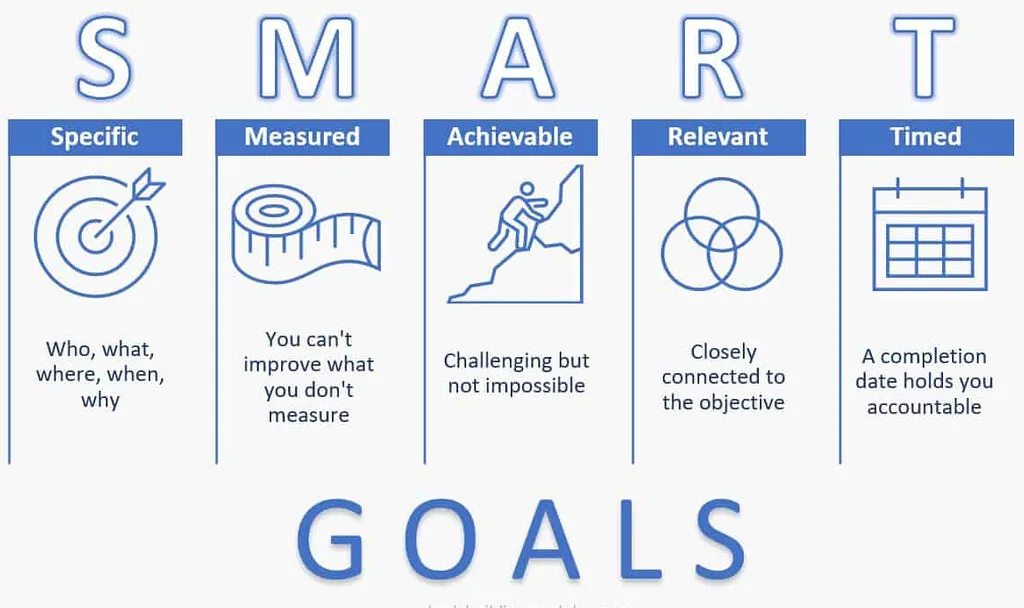Don’t just set goals – Achieve Them!
As we step into the new year, the time is ripe for self-reflection, growth, and the pursuit of both personal and professional development. Setting goals is a common practice, yet the stark reality is that a significant number of these goals remain unfulfilled. Studies consistently reveal that as low as 8% of personal and business goals are achieved. This disparity often leads to discouragement and a reluctance to engage in goal-setting endeavors. We will explore strategies to not only set meaningful goals but also to ensure your ability to achieve them, fostering a positive mindset towards your own development.

The Importance of New Year’s Resolutions
The tradition of making New Year’s resolutions holds a special place in the collective consciousness. As the calendar resets, billions of individuals take the opportunity to reflect on the past year’s achievements and set intentions for the year ahead. New Year’s resolutions provide a symbolic fresh start, a chance to recalibrate and redirect our energies toward personal and professional growth. However, as mentioned above only a small percentage of these goals are ever actually completed. It can be discouraging to hear statistics like this, but oftentimes it has less to do with the number or type of goals and more to do with our mindset when setting those goals and how we go about achieving them.
Reflecting on the Past
New Year’s resolutions are all about improving yourself each year and doing better than your last. Take a moment before creating your new goals to reflect on the achievements and challenges of the past year. What worked well? What could be improved? Use this reflection as a foundation for crafting resolutions that are realistic and personal for your life right now.
Setting Intentions for Growth
New Year’s resolutions offer a structured way to articulate your intentions for the upcoming year. Whether focused on professional development, skill learning, nurturing relationships, or personal well-being, these resolutions serve as a roadmap for your own life journey. By setting specific goals, you empower yourself to take deliberate actions towards success and better hold yourself accountable for taking those actions.

Understanding Your Goal Setting Mindset
The last thing to do before setting your New Year’s goals is to assess and, if necessary, transform your mindset. Past experiences with goal-setting can significantly influence your motivation, enthusiasm, and belief in the purpose of setting goals. If negative experiences have colored your perception, it’s crucial to approach goal setting with a fresh, positive mindset. Doing the same old thing will yield the same old results, so let’s explore how to change our approach. Here are 5 key tips that will help you in finding ways to clear your mindset, stay motivated, and help yourself set goals that you can achieve.
1. Cultivate a Positive Mindset
Embrace a new, positive mindset, affirming that this time will be different. Believe in your ability to succeed and let go of any past disappointments. This may sound easy on paper but can be quite difficult to achieve in practice. However, being able to clear any biases and start fresh is a pivotal part of being successful in a new endeavor such as goal setting.
2. Set Goals That Matter
Choose goals that are personally significant. Goals driven by your desires and passions are more likely to be achieved and have a lasting impact. Avoid setting goals based on external expectations; instead, focus on what truly matters to you.
3. Understand the Motivation Process
Though we set goals while passionate about their success, many times the passion wanes as progress slows, plateaus, or even backtracks. It takes more than just passion to achieve your goals; it takes self-regulated motivation. Before you get discouraged, recognize the simple progression from passion to motivation, commitment, willingness to sacrifice, and ultimately, goal achievement. This understanding forms the foundation for successful goal pursuit.
4. Prioritize and Limit
Acknowledge that you cannot achieve everything at once. It’s not uncommon for many to set a lot of goals in hopes of achieving as much as possible, or sometimes they are simply hoping to achieve a single one of those goals. Instead, identify the top 1 to 3 goals that hold the most significance for you at this moment and concentrate on those. A lot of focus on a few things is better for progress than a little focus on many things.
5. Follow the S.M.A.R.T. Process
Ensure your goals are Specific, Measurable, Attainable, Relevant, and Time-bound. This proven methodology provides a clear framework for goal setting, increasing the likelihood of success.

Achieving Your Goals
Take a moment to use these tips and set your new goals, find what is important to you, and create goals that you can achieve. With your goals set, your new focus should be on how to effectively execute them. Let’s explore strategies to make your goals visible, attractive, manageable, and ultimately, satisfying.
1. Keep Goals Visible
Ensure your goals remain at the forefront of your mind by making them visible. Utilize various platforms such as your phone, computer, vision board, and post-it notes to serve as constant reminders. However, make sure not to overwhelm yourself with these reminders. As anyone who sets too many reminders can tell you, there is such a thing as alert/reminder fatigue. This is when you are overwhelmed by so many reminders that you begin to ignore them more and more often, or even become blind to them. It’s best to use subtle reminders such as carrying a water bottle everywhere if your goal is to drink more water.
2. Break it Out
While breaking goals into smaller components is valuable, consider breaking them out into supportive actions:
- Identify one habit to stop. Is a habit in the way of you achieving your goal(s)? Is something actively hurting your goal? Etc. (e.g., stop doom scrolling)
- Identify one habit to start. The best way to stop a habit is to replace it. (e.g., start going for a 2-mile walk each day to support weight loss)
- Strengthen a relationship related to your goal. (e.g., walk with your spouse or seek advice from someone who has achieved a similar goal)
- Enhance a skill or mindset relevant to your goal. (e.g., read a fitness book or enroll in a fitness class to support weight loss)
3. Establish Accountability
Increase accountability by giving yourself a small reward when you achieve parts of your goal (e.g., go out to eat on your cheat day for being able to go to the gym every day during the week.) Involve the people around you and seek support and accountability from coworkers, friends, family, or your spouse to reinforce your commitment.
By integrating these strategies into your personal and professional development journeys, you pave the way to achieve your goals. Your passion for your goals, coupled with motivation, commitment, and a well-structured plan, ensures that this time, success is not just a possibility but an inevitability. As you embrace the new year, let the sacrifices made in pursuit of your goals be more than worthwhile, leading to the realization of your most coveted aspirations. Don’t just set goals—achieve them!
Thank you for writing this post!
Thank you for reading it! I hope it helped!
Pingback: A Business Plan: Things to Consider When Starting Your Business - Weaver Business Coaching
Pingback: 5 Tips for Creating a Culture of Accountability - Weaver Business Coaching
Skillful leaders know how to balance working on relationships and strengthening formal status and authority.
Both components need to be developed.
Comments are closed.